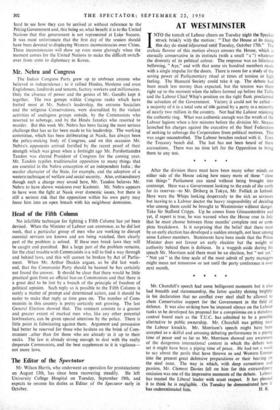AT WESTMINSTER I NTO the tumult of Labour cheers on Tuesday
night the Speaker struck briskly with the motion: " That the House at its rising this day do stand adjourned until Tuesday, October 17th." The archaic flavour of this motion always amuses the House, which is eternally conservative in its instincts (with a small " c ") whatever the diversity of its political colour. The response was an hilarious bellowing, " Aye," and with that some six hundred members made with a single impulse for the doors. There is room for a study of the saving power of Parliamentary ritual at times of tension or high feeling. The Hansard Society could take it up. The debate had been much less stormy than expected, but the tension was there right up to the moment when the tellers formed up before the Table and the Labour Chief Whip's position on the right flank proclaimed the salvation of the Government. Victory it could not be called— a majority of 6 in a total vote of 606 gained by a party in a minority of nearly two million in the country. Nor had the Labour rejoicing the authentic ring. What was authentic enough was the wrath of the Labour legions when a few minutes before the division Mr. Strauss launched his charges against the executive of the Steel Federation of seeking to sabotage the Corporation from political motives. This was anger uncontrolled. The Labour benches rocked with it. Even the Treasury bench did. The last has not been heard of these accusations._ There was no time left for the Opposition to bring them to any test.
After the division there must have been many sober minds on either side of the House asking how many more of these " close run things " Parliament can stand without being brought into contempt. Here was a Government looking to the ends of the earth for its reserves--to Mr. Driberg in Tokyo, Mr. Follick in Iceland. Here were the Whips looking desperately to the sick as saviours but leaving to a Labour doctor the heavy responsibility of deciding who among them could be brought to Westminster without danger. Take Sir Stafford Cripps. Up he comes from Gloucestershire and yet, if report is true, he was warned when the House rose in July that he must choose between three months' complete rest or com- plete breakdown. Is it surprising that the belief that there must be an early election has developed a sudden strength, not least among some Labour members. Statements have been made that the Prime Minister does not favour an early election but the weight of authority behind them is dubious. In a waggish aside during his speech Mr. Morrison said there must be an election, but " not yet." " Not yet " in the time scale of the most adroit of party managers might mean not tomorrow or not until the party conference is over next month.
Mr. Churchill's speech had some belligerent moments but it also had breadth and statesmanship, the latter quality shining brightly in his declaration that no conflict over steel shall be allowed to abate Conservative support for the Government in the field of defence. It was also striking how he imposed silence on the Labour ranks as he developed his proposal for a comproinise on a statutory control board such as the T.U.C. has admitted to be a possible alternative to public ownership. Mr. Churchill was getting near the Labour knuckle. Mr. Morrison's speech might have been accepted as a skilful and amusing debating performance in a piping time of peace and so far as Mr. Morrison showed any awareness of the dangerous international context in which the debate was set it might have been a piping time of peace.. He had not a word to say about the perils that have thrown us and Western Europe into the present great defensive preparations or their bearing on the steel issue. The way in which, with deep earnestness and passion, Mr. Clement Davies fell on him for this extraordinary omission was one of the impressive moments of the debate. Labour has treated the Liberal leader with scant respect. It has pleased it to think he is negligible. , On Tuesday he demonstrated how it






































 Previous page
Previous page